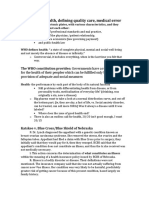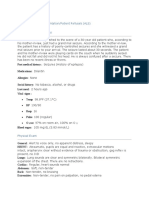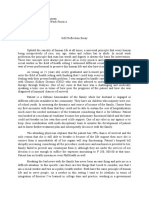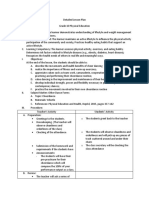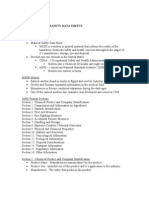Ethico
Ethico
Uploaded by
Penny Lyn Equito CalionCopyright:
Available Formats
Ethico
Ethico
Uploaded by
Penny Lyn Equito CalionCopyright
Available Formats
Share this document
Did you find this document useful?
Is this content inappropriate?
Copyright:
Available Formats
Ethico
Ethico
Uploaded by
Penny Lyn Equito CalionCopyright:
Available Formats
Ethico-Legal Issue
Presented a frail, obese, 82-year-old nursing home resident who is considered to be a difficult patient. One morning, she refuses her usual bath and then demands to be bathed at noon. She creates such a commotion that an aide agrees to help her bathe. Normally, the patient requires 2 people to assist her in the bathroom, and with only one aide to help her, she falls. She complains of hip pain and is transferred to her bed. Her primary physician is called and orders acetaminophen for the pain and an x-ray. Later in the afternoon, a nurse calls the physician's office for the x-ray result and is told by the physician's staff that the report will be available later. The patient complains of severe pain, and the nursing home supervisor calls the medical director who says that he will call the primary physician early the next morning. The next morning, the patient is sent to the emergency department where her fractured femur is documented. Unfortunately, the patient develops congestive heart failure and suddenly dies. The Department of Health fines the facility $500 and the family sues everyone, including the medical director.
The subsequent discussion began with the question of the difference between poor care, malpractice, and abuse. Who is at fault? Abuse or neglect does not have to be intentional, so perhaps this is unintentional abuse on the part of the aide. However, several discussants believed that although the aide may have exercised poor judgment, there is a major systems issue and we should look for a pattern. Poor care, abuse, and malpractice are not mutually exclusive, and there can be individual issues and systems issues. An experienced long-term care nurse sensed the need for nursing advocacy for the patient, for example, pushing for more appropriate pain control. She also saw the episode as an opportunity for staff education. One researcher noted that to laypeople, intentional vs unintentional harm is an important distinction. Professionals tend to downplay intentionality.
Legally there is not enough information to tell whether this would be a criminal or civil case. The primary physician's conduct is clearly inappropriate and the medical director is likewise out of line. The patient's pain management should be a priority, but does inadequate pain management always constitute elder abuse?
What should have happened? The immediate consensus was that the medical director should have promptly sent the patient to the emergency department. The Health Department dropped the ball with such a minor penalty. In some states, the need for effective palliation can override a Do Not Hospitalize order if pain control cannot be achieved in long-term care.
You might also like
- Aetcom 3.5Document4 pagesAetcom 3.5Kondayoor SharadaNo ratings yet
- Marine Department - MCVS&RDocument5 pagesMarine Department - MCVS&REliza's Soothing Sounds100% (1)
- Case Report Analysis: Angeles University Foundation College of Nursing Medical Surgical Nursing Laboratory (NCM 0112 RLE)Document15 pagesCase Report Analysis: Angeles University Foundation College of Nursing Medical Surgical Nursing Laboratory (NCM 0112 RLE)Katreena SalvadorNo ratings yet
- Code of Ethics For NursesDocument5 pagesCode of Ethics For NursesKamran Khan100% (1)
- Mae LNMDocument9 pagesMae LNMCristina L. Jayson33% (3)
- Teenagers Games - ESL EnglishDocument2 pagesTeenagers Games - ESL EnglishclaricethiemiNo ratings yet
- Sickness and Health, Defining Quality Care, Medical ErrorDocument95 pagesSickness and Health, Defining Quality Care, Medical Errorcrumps09No ratings yet
- Dealing With ComplaintsDocument16 pagesDealing With Complaintsamalia rieska mauliddyaNo ratings yet
- Ethical Dilemma CaseDocument2 pagesEthical Dilemma CaseQuinonez Anna MarieNo ratings yet
- Introduction To Medical Ethics PointsDocument9 pagesIntroduction To Medical Ethics PointsClint KashNo ratings yet
- Ethical PaperDocument6 pagesEthical Paperapi-284664489No ratings yet
- Medical JurisprudenceDocument46 pagesMedical JurisprudenceBea AlonzoNo ratings yet
- Copy of Group 6-HA Lec Final RequirementDocument5 pagesCopy of Group 6-HA Lec Final RequirementJAYNE FELINE GRIBADORNo ratings yet
- Copy of Group 6-HA Lec Final RequirementDocument5 pagesCopy of Group 6-HA Lec Final RequirementJAYNE FELINE GRIBADORNo ratings yet
- Healthcare Facility Liable For Student Nurse Error: Court of Appeals of Ohio, 1996Document34 pagesHealthcare Facility Liable For Student Nurse Error: Court of Appeals of Ohio, 1996Maclyn VillaseñorNo ratings yet
- Nursing Clinical Case Study AnalysisDocument5 pagesNursing Clinical Case Study Analysisapi-664257988No ratings yet
- Nelda Azas Aryuni - 20710106 - PPT EUTHANASIA-dikonversiDocument16 pagesNelda Azas Aryuni - 20710106 - PPT EUTHANASIA-dikonversiAnita SulistyowatiNo ratings yet
- An Ethical Dilemma Found in A Case Study: Learning ActivityDocument3 pagesAn Ethical Dilemma Found in A Case Study: Learning ActivityENTICE PIERTONo ratings yet
- Ethical Issues in NursingDocument6 pagesEthical Issues in Nursingkayzhel100% (1)
- Sexual MisconductDocument5 pagesSexual MisconductNikhil SahuNo ratings yet
- Rielle Bioethics AssDocument7 pagesRielle Bioethics Assdrae syNo ratings yet
- 362 Ethics PresentationDocument15 pages362 Ethics Presentationapi-302664277No ratings yet
- Document 16Document5 pagesDocument 16api-315322140No ratings yet
- Med LawDocument4 pagesMed LawBekama DawitNo ratings yet
- Bioethics (Case Study 2)Document4 pagesBioethics (Case Study 2)Cameron De GuzmanNo ratings yet
- Bioethics AETCOMDocument58 pagesBioethics AETCOMBabita RaniNo ratings yet
- Beltran, Justin KyleDocument4 pagesBeltran, Justin KyleKYLENo ratings yet
- 2.02a+b AbulazizDocument5 pages2.02a+b Abulazizazooz000503000No ratings yet
- Ethical Dilemma in NSG MGMTDocument4 pagesEthical Dilemma in NSG MGMTAhmad BaolayyanNo ratings yet
- Ethical Principle OnDocument10 pagesEthical Principle OnGladz C CadaguitNo ratings yet
- ICLADocument9 pagesICLAburage.m01No ratings yet
- Report - For MaamDocument7 pagesReport - For MaamSherchen Antonio-CortesNo ratings yet
- 362 Ethics PresentationDocument15 pages362 Ethics Presentationapi-302320251No ratings yet
- 16 2011-16-AJPP-Avoidable Childhood - Nazir and Zaidi 2011 FDocument6 pages16 2011-16-AJPP-Avoidable Childhood - Nazir and Zaidi 2011 FDr. Taha NazirNo ratings yet
- 15 2011-15-AJPP Nazir and Zaidi 2011Document6 pages15 2011-15-AJPP Nazir and Zaidi 2011Dr. Taha NazirNo ratings yet
- Fully Alive: Insights into Living with Extraordinary HealthFrom EverandFully Alive: Insights into Living with Extraordinary HealthNo ratings yet
- Medication ErrorsDocument5 pagesMedication ErrorsWendy EscalanteNo ratings yet
- Medical Ethics CasesDocument28 pagesMedical Ethics CasesHa LeemNo ratings yet
- Malpractice CaseDocument4 pagesMalpractice CaseAr-jay JubaneNo ratings yet
- EMS LawsuitsDocument9 pagesEMS LawsuitsIlyes FerenczNo ratings yet
- How Doctors DieDocument8 pagesHow Doctors DieFeat GasNo ratings yet
- The Waits That MatterDocument3 pagesThe Waits That MattercarlodapNo ratings yet
- AssignmentDocument3 pagesAssignmentKim Rose SabuclalaoNo ratings yet
- Part IiiDocument69 pagesPart IiiChee TohsNo ratings yet
- Hospitals, Doctors, Patients: Memories from a Cottage IndustryFrom EverandHospitals, Doctors, Patients: Memories from a Cottage IndustryNo ratings yet
- Ipso Facto Is A Latin PhraseDocument7 pagesIpso Facto Is A Latin Phrasehirooo_06No ratings yet
- Medical Errors and Adverse Events: Managing the Aftermath: Managing the AftermathFrom EverandMedical Errors and Adverse Events: Managing the Aftermath: Managing the AftermathNo ratings yet
- Code of Ethics For NursesDocument3 pagesCode of Ethics For NursesLady Mae Ramos100% (3)
- Two Ethics Case ScenariosDocument3 pagesTwo Ethics Case ScenariosEguia NielNo ratings yet
- Consent For Below Knee Amputation: Task: No Need For HX and Exam. Obtain Consent From PT and Answer Examiner's QuestionsDocument12 pagesConsent For Below Knee Amputation: Task: No Need For HX and Exam. Obtain Consent From PT and Answer Examiner's QuestionsffaaNo ratings yet
- Clinical Nursing JudgementDocument7 pagesClinical Nursing Judgementapi-453417498No ratings yet
- Leadership & Management Practice QuestionsDocument7 pagesLeadership & Management Practice Questionshyerimyun0331No ratings yet
- Extended and Expanded Role of Nurse in EmergencyDocument23 pagesExtended and Expanded Role of Nurse in Emergencyankita guptaNo ratings yet
- Clubbed Ques 2Document19 pagesClubbed Ques 2RadhakrishnanNo ratings yet
- Final Ethics PaperDocument6 pagesFinal Ethics Paperapi-380704330No ratings yet
- Patient Care Issues Management Issues and Employment IssuesDocument22 pagesPatient Care Issues Management Issues and Employment IssuesjodibalaNo ratings yet
- Bioethical, Legal IssuesDocument6 pagesBioethical, Legal IssuesAlyxen PelingenNo ratings yet
- Euthanasia ScriptDocument1 pageEuthanasia ScriptJowyn SeetNo ratings yet
- Ethics Paper FinalDocument6 pagesEthics Paper Finalapi-308162223No ratings yet
- Self-Reflection EssayDocument3 pagesSelf-Reflection EssayMarie Antonette De GuzmanNo ratings yet
- GeroDocument7 pagesGeroJehanie LukmanNo ratings yet
- Population ExplosionDocument4 pagesPopulation ExplosionMonika KhariNo ratings yet
- DLP in Pe 10 Cheerdance 3 Final PracticumDocument4 pagesDLP in Pe 10 Cheerdance 3 Final PracticumChristopherArjayCigaral50% (2)
- Form ObatDocument31 pagesForm ObatAsep MiftahudinNo ratings yet
- TECH 434 Msds - Material Safety Data Sheets Student Project by Robert M. KelloggDocument11 pagesTECH 434 Msds - Material Safety Data Sheets Student Project by Robert M. KelloggMichael J. NewmanNo ratings yet
- Requirement of Dissolution Test For f2 - Gastro Resistant TabletDocument17 pagesRequirement of Dissolution Test For f2 - Gastro Resistant Tabletfad12345No ratings yet
- WHO Skin NTD Framework EngDocument112 pagesWHO Skin NTD Framework Engblendam.ferreiraNo ratings yet
- Discriminación Interseccional Contra Mujeres y Niñas Con Discapacidad en Oportunidades Educativas en IndiaDocument8 pagesDiscriminación Interseccional Contra Mujeres y Niñas Con Discapacidad en Oportunidades Educativas en IndiaAri IANo ratings yet
- Mustard Rapeseed Profile PDFDocument70 pagesMustard Rapeseed Profile PDFVatsal GadhiaNo ratings yet
- Food Laws and RegulationsDocument8 pagesFood Laws and RegulationsGajendra Singh Raghav0% (1)
- Uveitis: by Karen Lynn AtuelDocument21 pagesUveitis: by Karen Lynn AtuelMarian Joyce Princess Yuque100% (1)
- EVAL EXAM Pedia ANS KEY PROF Octubre - PEDIATRIC NURSING EVALUATIVE EXAM ANSWER KEY - Studocu 2Document1 pageEVAL EXAM Pedia ANS KEY PROF Octubre - PEDIATRIC NURSING EVALUATIVE EXAM ANSWER KEY - Studocu 2Ernesto CaroNo ratings yet
- Flexicare Dental Network ListDocument255 pagesFlexicare Dental Network ListAndani ManzereNo ratings yet
- National Housing Policy (NHP) - 1998Document2 pagesNational Housing Policy (NHP) - 1998Ms. Sangeetha Priya I Assistant Professor I - SPADENo ratings yet
- 1 Chapter 6 The Practice of Pre-Therapy: Behavioral ExpressionDocument29 pages1 Chapter 6 The Practice of Pre-Therapy: Behavioral ExpressionAnonymous 2a1YI92k9LNo ratings yet
- Protein Drug BindingDocument26 pagesProtein Drug BindingBandita DattaNo ratings yet
- 9993 - Sunoco 2-Cycle 12 - 1 QTDocument17 pages9993 - Sunoco 2-Cycle 12 - 1 QTMariajosé Cabrera MuñozNo ratings yet
- Air Pollution Lect.1Document277 pagesAir Pollution Lect.1Nah Sr AdNo ratings yet
- Knowledge and Factors Related To Smoking Among University Students at Hodeidah University, YemenDocument8 pagesKnowledge and Factors Related To Smoking Among University Students at Hodeidah University, YemenAli Ahmed 33No ratings yet
- The Danny Baker StoryDocument190 pagesThe Danny Baker Storyguenni42No ratings yet
- Isbm AccreditationsDocument9 pagesIsbm AccreditationsRAJIV SINGHNo ratings yet
- Love and Food AddictionDocument26 pagesLove and Food AddictionbroogazwiNo ratings yet
- 1.Dr. Inneke Jane Cosmobeaute 1 BOTULINUM TOXINDocument26 pages1.Dr. Inneke Jane Cosmobeaute 1 BOTULINUM TOXINemilly vidya100% (1)
- Nutrition MonthDocument3 pagesNutrition Monthnymsnyms m. docdocilNo ratings yet
- Types of DFDocument48 pagesTypes of DFIdenyi Daniel EwaNo ratings yet
- DRUGSDocument4 pagesDRUGSHoney Grace L LemorenasNo ratings yet
- Assignment On Drug Addiction and Increasing Crime in SylhetDocument11 pagesAssignment On Drug Addiction and Increasing Crime in Sylhetolidgura50% (4)
- Dopamine HCLDocument1 pageDopamine HCLIvanne Hisoler100% (3)
- LevetiracetamDocument4 pagesLevetiracetamGwyn RosalesNo ratings yet






